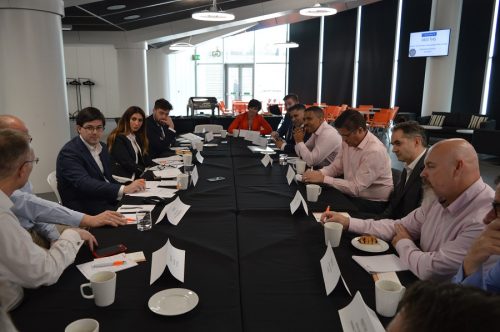6 lessons for businesses that want to be genuinely innovative


They debated how to create the right culture within a business so that innovative thinking can flourish and also how to deal with good ideas that don’t work out.
Failure should not be a dead end, but the route to success

Dr Leila Jeffers, Grant Thornton
Key to success in this area is creating an environment that not only accepts failure, but welcomes it.
“To be innovative, you’ve got to fail,” said Chris Fower, director of creativity and innovation at Warwick Music Group.
“Everyone talks about success, bringing things to market successfully and monetisation. Those are the things that suppress failure.”
Dr Leila Jeffers, innovation manager at Grant Thornton, added: “That’s part of the culture, as leaders, to accept that failure, to allow that within a business.”
Don Dhaliwal, director of Conigital, a Birmingham-based transport infrastructure business which uses Internet of Things technology, said: “You need to have a culture of accepting that you will have, say, 90% failure for 10% success.”
Innovators can’t be swamped by their day jobs
Dhaliwal believes innovation works best with a team that is not distracted by other workloads.
“It can’t be within the existing departments themselves, I don’t think there’s enough bandwidth for them to innovate and be able to deliver their business as usual,” he said.
“You need a separate innovation team, who don’t have a typical job description, are cross functional and therefore able to work with any department.
“It works really well when the department gets all of the glory when it is successful, but the innovation team takes the blame where it has failed.”
…but they can’t be isolated from the day-to-day realities of the business, either
Simon Griffiths, operations director at Coventry-based Impression Technologies, said: “The danger of a large corporate is you get the innovation centre which comes up with some great, clever ideas, but then there’s no call for it.
“Conversely, you need to be making sure the business development teams are actually saying what the customer is wanting.
“The culture that the chief executive wants is where there’s a bit of pull from the sales team and a bit of push from the R&D team, and to get those two to work together as a team.”
That avoids the problem of being wholly reliant on customers’ requests, which is best captured in the quote attributed to car maker Henry Ford, who was meant to have quipped: “If I had asked people what they wanted, they would have said faster horses.”
Innovation, like Ford delivered a century ago, requires a different approach.
“If you go disruptively to market with a completely new idea, the customer doesn’t know what they need it or not,” said Fower.
“Upstream marketing isn’t going to help you in that situation, so there’s a hard tension there.
“But if you drive everything down through marketing, I see that as a direct suppressor of innovation.
“In my industry, the music industry, with records, their new product is the one they made in the 50s because that’s what the marketing team is telling them the customer wants. They’re actually going backwards, not forwards.”
Don’t play the blame game

Jonathan Firnberg
Telford-based Protolabs lays claim to being the world’s fastest manufacturer of custom prototypes and on-demand production parts, with manufacturing facilities in eight countries. It creates rapid prototypes with lead times that don’t go above two-and-a-half weeks.
Its Northern European sales director Jonathan Firnberg highlighted the downside of having a separate team that is responsible for innovation.
He said: “The danger of having the ringfenced technology group in a culture that demonises failure is it is somewhere to point the finger at.
“What we do as an organisation globally, is we bring teams from across the organisation to work together in a co-operative, committee-type environment to look at new developments in particular areas of the business, be it technical, software, systems, process.
“That means we have input from all areas, but also a buy-in from all areas and that removes that culture of blame.”
Instead, create a KPI for failure
The consequence of not playing the blame game is it provides more freedom for people to experiment and be more ambitious with their thinking – to be genuinely innovative rather than play safe with small, iterative improvements.
Mark Neale, a partner at Freeths, specialising in IT and data, argued that “a person working in a tech savvy organisation that has had success from innovation failures is more likely to be pro-risk when they move to a different industry where innovation is deemed uncertain.”
Having the right mindset was also a key factor for Keith Munday, commercial director at 100% renewable energy supplier Bryt Energy.
He said: “For larger companies, not smaller ones, this is all about the attitude to risk, and how targets are set from the top. People are asked for a plan and they’re expected to deliver to the plan.
“How many people in big companies say: ‘Here are your targets, this is what I want you to do, and actually I expect 20% of it to fail. And if you’re not failing on 20%, you’re not trying hard enough, because you’re not stretching yourself’.
“It’s the fundamental core of where you start from, and how you set the expectations of your staff, and how you encompass failure. There’s never, ever actually a failure, because what we deem a failure is actually just a learning point to move us to the next stage.”
Embrace failure, but don’t cling to it
The academic approach can add value when companies are being innovative, argued James Sharp, business engagement partner at the University of Birmingham.

James Sharp, University of Birmingham
“The thing we see is that there is an increasing need for failure to happen quickly, to fail fast,” he said. “You have to bake that into a project from the outset, and actually look for where you think your pinch points are going to be and test those from the outset. Then if it doesn’t work, at least, you know, you haven’t wasted a lot of money on it.
“But increasingly, people don’t aim for those – milestones are set by success, and not by failure. When we come at it from an academic perspective and a scientific perspective, you take your hypothesis and then you try and disprove it. That’s where I think the university kind of R&D is. It is more synced with that ‘fail fast’ approach.”









